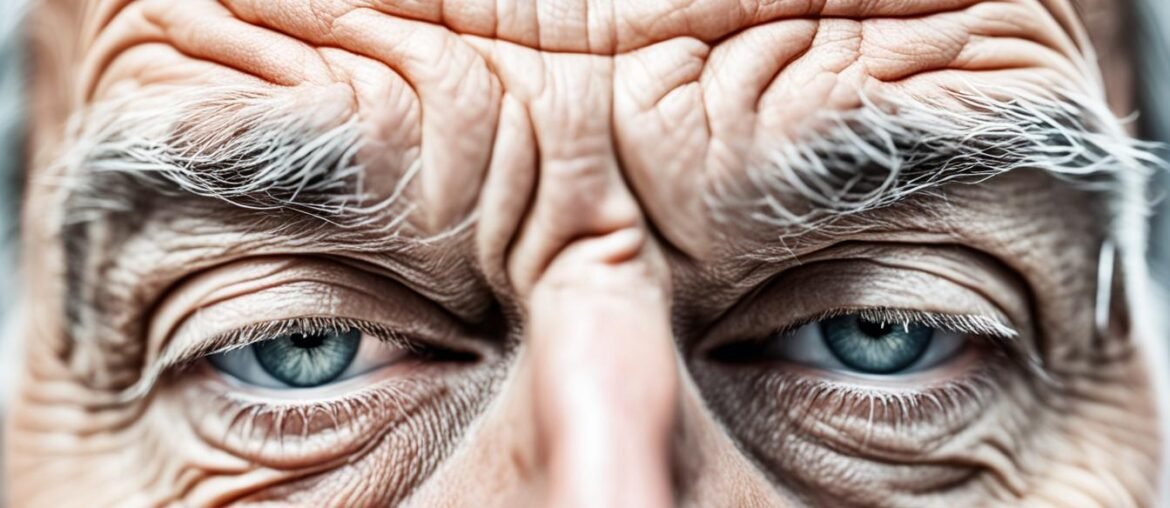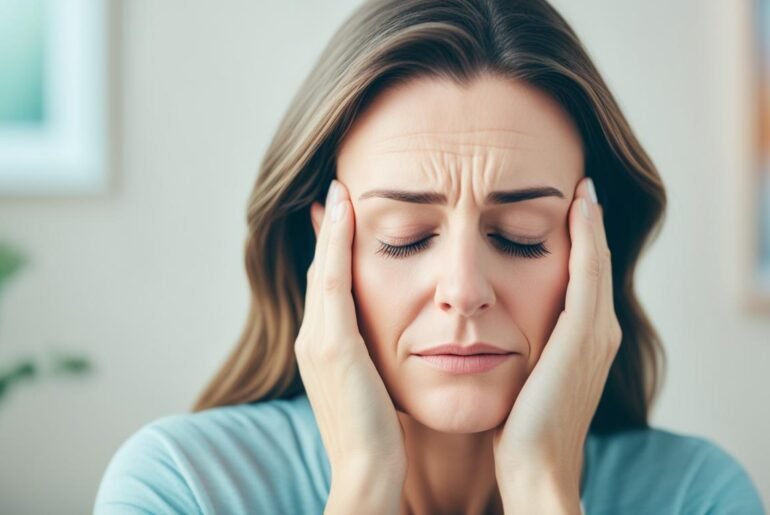Did you know that stress can cause wrinkles on your skin? It’s true! In fact, stress-induced wrinkles are a common concern for many individuals. These lines and creases are not only a result of the natural aging process but are also caused by the hormone cortisol, which breaks down collagen and reduces its levels in the skin. The impact of stress on our skin can be significant, leading to the formation of wrinkles, pigmentation, and under-eye circles.
Preventing stress wrinkles requires a multi-faceted approach. By reducing stress levels, incorporating a skincare routine that targets stress-induced aging signs, and adopting healthy lifestyle habits, you can combat the effects of stress on your skin and maintain a more youthful appearance.
Key Takeaways:
- Stress can cause wrinkles on the skin, known as stress wrinkles.
- Stress wrinkles result from the hormone cortisol, which breaks down collagen.
- Stress wrinkles are different from age-related wrinkles in terms of their location on the face.
- UV exposure, smoking, poor diet, and lack of sleep can contribute to the formation of wrinkles.
- Preventing stress wrinkles involves reducing stress levels, wearing sunscreen, following a healthy diet, getting enough sleep, staying hydrated, quitting smoking, stimulating collagen production, and finding ways to relax.
What are stress wrinkles and how do they form?
Stress wrinkles are lines or creases on the skin that are caused by stress. When a person is stressed, the body produces cortisol, a hormone that breaks down collagen. Collagen is responsible for the skin’s elasticity and youthfulness. As cortisol levels increase, collagen levels decrease, leading to the formation of wrinkles. Stress wrinkles can become more pronounced when a person is feeling stressed.
A visual representation of the formation of stress wrinkles can be seen in the image above.
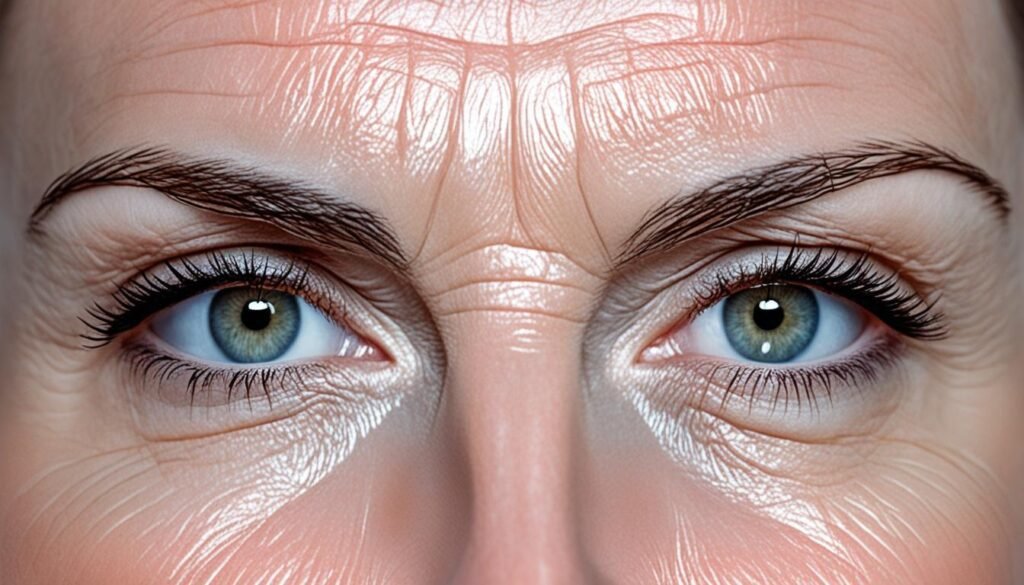
Stress wrinkles differ from age-related wrinkles in terms of their location on the face. Age-related wrinkles typically form on the forehead, around the eyes, and at the corners of the mouth. These wrinkles are a natural part of the aging process and are influenced by factors such as genetics, sun exposure, and lifestyle habits.
“The location of stress wrinkles is typically between the eyebrows and on the bridge of the nose,” explains Dr. Samer Jaber, a renowned dermatologist. “These wrinkles are often a result of repeated facial expressions and muscle tension caused by stress.”
Skin experts suggest that stress-induced wrinkles are a manifestation of the body’s response to chronic stress. When we experience stress, the production of the hormone cortisol increases, leading to the breakdown of collagen and elastin in the skin. Collagen and elastin are crucial for maintaining the skin’s firmness and elasticity, so their depletion can result in the formation of wrinkles.
“Stress can also lead to other visible signs of aging, such as pigmentation and under-eye circles,” notes Dr. Michele Green, a respected dermatologist. “These signs often accompany stress wrinkles, further emphasizing the impact of stress on skin health.”
While age-related wrinkles are a natural part of getting older, stress wrinkles can occur at any age and are influenced by environmental and lifestyle factors. It is important to address stress and adopt healthy coping mechanisms to minimize the development of stress-induced wrinkles. Additionally, proper skincare and a consistent anti-aging routine can help diminish the appearance of both stress and age-related wrinkles.
What else causes wrinkles?
Apart from stress, there are several other factors that can contribute to the formation of wrinkles. These include:
UV Exposure and Wrinkles
UV exposure from the sun’s harmful rays can accelerate the aging process and lead to the development of wrinkles. The ultraviolet rays can damage collagen and elastin in the skin, causing it to lose its firmness and elasticity. It is important to protect your skin from UV radiation by wearing sunscreen with a high SPF, seeking shade, and wearing protective clothing.
Smoking and Wrinkles
Smoking cigarettes not only harms your internal organs but also takes a toll on your skin. Smoking reduces collagen production and restricts blood flow to the skin, leading to wrinkles and premature aging. Quitting smoking can improve the health and appearance of your skin.
Poor Diet and Wrinkles
Your diet plays a significant role in the health and appearance of your skin. Consuming a diet high in processed foods, sugar, and unhealthy fats can contribute to wrinkles. On the other hand, a diet rich in fruits, vegetables, whole grains, and lean proteins provides essential nutrients that promote healthy skin.
Lack of Sleep and Wrinkles
Not getting enough sleep can affect the overall health of your skin. When you don’t get adequate rest, your body produces more cortisol, a stress hormone that breaks down collagen and elastin. This can lead to the formation of wrinkles and fine lines. Establishing a consistent sleep routine and practicing good sleep hygiene can help improve the health and appearance of your skin.
In summary, along with stress, factors such as UV exposure, smoking, poor diet, and lack of sleep can contribute to the formation of wrinkles. Taking steps to protect your skin from UV rays, quitting smoking, maintaining a healthy diet, and getting sufficient sleep are essential for maintaining youthful and wrinkle-free skin.
How can you prevent wrinkles from forming?
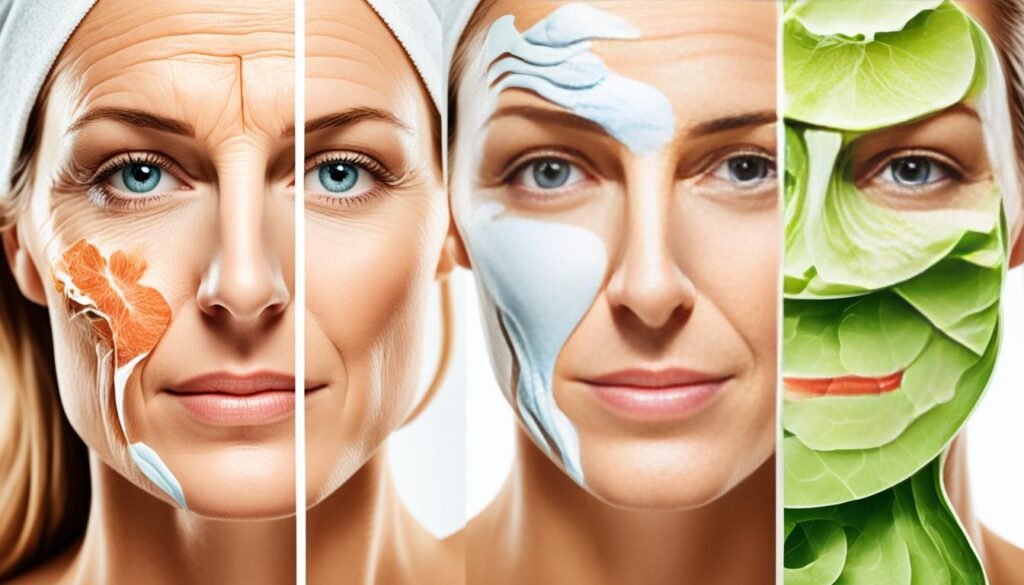
To prevent wrinkles, there are several key measures that can be taken. By incorporating these practices into your daily routine, you can maintain a youthful and radiant complexion.
-
Reduce Stress: Stress can accelerate the aging process and contribute to the formation of wrinkles. Engaging in stress-reducing activities such as yoga, meditation, and exercise can help mitigate the effects of stress on the skin.
-
Wear Sunscreen: The harmful UV rays of the sun can damage the skin and lead to premature aging. Applying a broad-spectrum sunscreen with an SPF of 30 or higher daily, even on cloudy days, can safeguard your skin and prevent wrinkles.
-
Maintain a Healthy Diet: Consuming a nutritious diet rich in vitamins, minerals, and antioxidants is essential for skin health and vitality. Include plenty of fruits, vegetables, whole grains, lean proteins, and healthy fats in your diet to nourish your skin from within.
-
Get Enough Sleep: A good night’s sleep allows the body to repair and regenerate, including the skin. Aim for 7-9 hours of quality sleep each night to promote optimal skin health and prevent the formation of wrinkles.
-
Stay Hydrated: Adequate hydration is crucial for maintaining plump and supple skin. Drink plenty of water throughout the day to keep your skin hydrated and reduce the risk of developing wrinkles.
-
Stop Smoking: Smoking accelerates the aging process and contributes to the formation of wrinkles. Quitting smoking not only improves overall health but also helps preserve the youthfulness and elasticity of the skin.
-
Stimulate Collagen Production: Collagen is a protein that gives the skin its structure and elasticity. Engaging in activities that promote collagen production, such as regular exercise and incorporating collagen-boosting ingredients in your skincare routine, can help prevent wrinkles.
-
Relax: Chronic stress can take a toll on your skin’s health and contribute to the formation of wrinkles. Take time to relax and engage in activities that bring you joy and reduce stress levels.
By following these preventive measures, you can safeguard your skin from the effects of aging and maintain a youthful and vibrant appearance.
Skincare products for wrinkles
When it comes to reducing the appearance of wrinkles, skincare products play a crucial role. There are various anti-aging skincare products available in the market that can help improve the look of fine lines and wrinkles.
Retinoid creams or serums are particularly effective in combating wrinkles. These products contain vitamin A derivatives that stimulate collagen production and promote skin renewal. By increasing collagen levels, retinoids can help diminish the appearance of wrinkles and fine lines, resulting in smoother and more youthful-looking skin.
Vitamin C serums are another powerful weapon in the fight against wrinkles. These serums are packed with antioxidants that protect the skin from free radical damage. The antioxidant properties of vitamin C also help to brighten the skin and even out the skin tone, enhancing the overall appearance of wrinkles.
Aside from retinoid creams and vitamin C serums, there are other skincare products specifically designed to target wrinkles. These include lifting serums, eye creams, masques, and age-delay creams. Each of these products is formulated with ingredients that nourish the skin, enhance its elasticity, and reduce the visible signs of aging.
When incorporating skincare products into your routine, it’s important to choose ones that are suitable for your skin type and concerns. Consulting with a dermatologist or skincare professional can help you identify the best products for your specific needs.
Conclusion
Preventing stress-induced aging and minimizing the appearance of stress-induced wrinkles is achievable by adopting a holistic approach to skincare and overall well-being. By implementing the following practices, you can combat stress-related signs of aging:
- Reduce stress levels: Engage in activities such as yoga, meditation, or exercise to alleviate stress and promote skin health.
- Wear sunscreen: Protect your skin from harmful UV rays by applying sunscreen with an SPF of 30 or higher daily.
- Follow a healthy diet: Consume a nutritious diet rich in vitamins and minerals to support overall skin health.
- Get enough sleep: Prioritize quality sleep to minimize stress levels and promote skin regeneration.
- Stay hydrated: Drink an adequate amount of water daily to maintain skin hydration and elasticity.
- Quit smoking: Smoking accelerates the aging process, leading to prematurely wrinkled skin. Quitting smoking can help preserve skin health.
- Stimulate collagen production: Include exercises, a collagen-stimulating diet, and the use of appropriate skincare products to boost collagen levels and reduce wrinkles.
- Find ways to relax: Take time for activities that reduce stress and promote relaxation, such as reading, spending time outdoors, or engaging in hobbies you enjoy.
Skincare products, such as retinoid creams and vitamin C serums, can complement your efforts in preventing wrinkles and stress-induced aging signs. These products are known for their efficacy in reducing the appearance of wrinkles and promoting overall skin health.
Remember, addressing stress-induced wrinkles and maintaining skin health requires a comprehensive approach that combines lifestyle modifications, skincare practices, and self-care activities.
| Prevention Methods | Effectiveness | Benefits |
|---|---|---|
| Reducing stress levels | High | Improves overall well-being and reduces the impact of stress on skin health |
| Wearing sunscreen | High | Protects skin from UV damage, reducing the risk of wrinkles and other signs of aging |
| Following a healthy diet | Moderate | Nourishes the skin and provides essential nutrients for collagen production |
| Getting enough sleep | High | Supports skin regeneration and reduces stress levels |
| Staying hydrated | Moderate | Maintains skin hydration and elasticity |
| Quitting smoking | High | Prevents premature aging and improves overall skin health |
| Stimulating collagen production | High | Reduces the appearance of wrinkles and promotes skin firmness |
| Finding ways to relax | Moderate | Reduces stress levels and promotes overall well-being |
| Using skincare products | Moderate | Complements preventive measures and helps reduce the appearance of wrinkles |
Additional Information
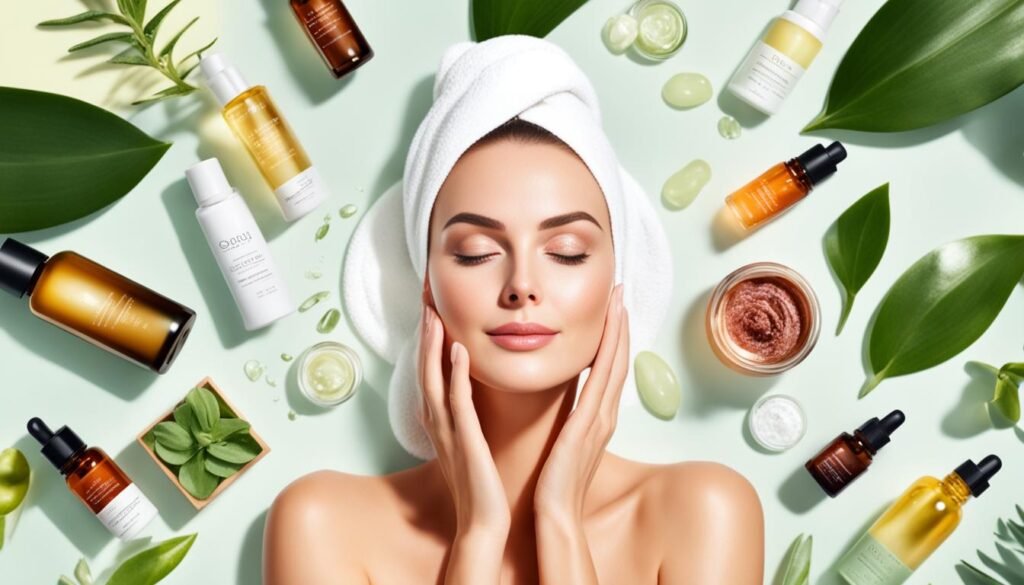
In addition to the preventive measures mentioned earlier, there are skincare routines and treatments available for addressing stress wrinkles. By following stress-induced skincare routines and exploring remedies for stress wrinkles, you can effectively combat the signs of aging caused by stress.
- Start by incorporating specific anti-aging products into your skincare routine. Look for moisturizers, serums, and masks that are specially formulated to target stress-induced wrinkles. These products often contain ingredients like retinol, hyaluronic acid, and peptides to hydrate the skin, boost collagen production, and diminish the appearance of fine lines and wrinkles.
- Consider professional treatments that can further improve the appearance of stress wrinkles. Microneedling, a procedure that stimulates collagen production by creating controlled micro-injuries to the skin, can help reduce the depth of wrinkles. Chemical peels, which exfoliate the outer layer of skin, can also promote collagen production and improve skin texture. Injectables like dermal fillers and neurotoxins can be used to temporarily smooth out wrinkles. Radiofrequency therapies, such as microneedling with radiofrequency or radiofrequency skin tightening, can tighten the skin and minimize the appearance of wrinkles.
However, it is important to note that the best course of action for your stress wrinkles may vary depending on your individual needs. Consulting with a dermatologist or skincare professional is crucial to determine the most suitable treatments and products for your specific concerns.
References
The information in this article is based on recommendations from dermatologists Dr. Samer Jaber and Dr. Michele Green, as well as clinical studies on stress-induced aging.
Dr. Samer Jaber is a board-certified dermatologist and the founder of Washington Square Dermatology in New York City. He specializes in medical and cosmetic dermatology and has been featured in numerous publications and media outlets for his expertise.
Dr. Michele Green is a renowned dermatologist based in New York City. With over 25 years of experience, she is known for her comprehensive approach to skincare and has appeared on various television shows and publications.
The recommendations from these dermatologists are backed by scientific studies on stress-induced aging. These studies have examined the effects of stress on the skin, the role of cortisol in collagen breakdown, and the development of stress wrinkles.
When seeking skincare advice or considering treatment options, it is always recommended to consult with a healthcare professional or dermatologist who can provide personalized recommendations based on individual needs and concerns.
FAQ
What are stress wrinkles and how do they form?
Stress wrinkles are lines or creases on the skin that are caused by stress. When a person is stressed, the body produces cortisol, a hormone that breaks down collagen. Collagen is responsible for the skin’s elasticity and youthfulness. As cortisol levels increase, collagen levels decrease, leading to the formation of wrinkles. Stress wrinkles can become more pronounced when a person is feeling stressed.
Stress wrinkles differ from age-related wrinkles in terms of their location on the face. Age-related wrinkles tend to form on the forehead, around the eyes, and at the corners of the mouth. On the other hand, stress wrinkles typically form between the eyebrows and on the bridge of the nose. Stress can also cause other signs of aging, such as pigmentation and under-eye circles.
What else causes wrinkles?
Apart from stress, there are other factors that can contribute to the formation of wrinkles. These include UV exposure, which damages collagen and elastin in the skin, smoking, which reduces collagen production, poor diet, which can lead to unhealthy skin, and lack of sleep, which can increase stress levels and result in wrinkles.
How can you prevent wrinkles from forming?
To prevent wrinkles, it is important to reduce stress levels through activities like yoga, meditation, and exercise. Wearing sunscreen daily with an SPF of 30 or higher helps protect the skin from UV damage. Following a healthy diet that is rich in vitamins and minerals is also beneficial. Getting enough sleep, staying hydrated, and quitting smoking are other preventive measures. Stimulating collagen production through exercise, diet, and the use of certain skincare products can help prevent wrinkles. Finally, it is crucial to find ways to relax and enjoy life to reduce stress levels.
What skincare products are available for wrinkles?
Skincare products can help reduce the appearance of wrinkles. Retinoid creams or serums are effective in stimulating collagen production and improving the appearance of fine lines and wrinkles. Vitamin C serums, with their antioxidant properties, can protect the skin from damage and improve the appearance of wrinkles. There are various skincare products available in the market that specifically target wrinkles, such as lifting serums, eye creams, masques, and age-delay creams.
Is there any additional information on stress-induced skincare routines and treatments for wrinkles?
In addition to the preventive measures mentioned earlier, there are skincare routines and treatments available for addressing stress wrinkles. Skincare routines may involve the use of specific anti-aging products, such as moisturizers, serums, and masks, that target stress-induced wrinkles. Professional treatments like microneedling, chemical peels, injectables, and radiofrequency therapies can stimulate collagen production and improve the appearance of stress wrinkles. It is important to consult with a dermatologist or skincare professional to determine the best course of action for individual needs.
Can you provide some references for further reading?
The information in this article is based on recommendations from dermatologists Dr. Samer Jaber and Dr. Michele Green, as well as clinical studies on stress-induced aging. These sources provide valuable insights into the causes, prevention, and treatment of stress wrinkles. It is always advisable to consult with a healthcare professional for personalized advice and recommendations.

